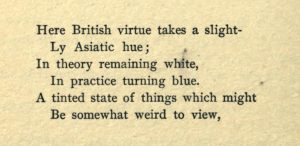[Editor: This poem by E. J. Brady was published in Bells and Hobbles (1911).]
Northern Night.
The blistered roof, ’neath which we dwell,
Blazed out across the Bay
When Night in cooling quiet fell
With Sunset, gold and gay;
But now the breeze will freshen ’till
An hour before the Day.
Mimosa San in Chinatown,
Fresh-powdered, plump and tan,
Inveigles wooers — white or brown —
With eyes, and teeth, and fan;
Mimosa San of Chinatown,
But erstwhile of Japan.
Here British virtue takes a slight-
Ly Asiatic hue;
In theory remaining white,
In practice turning blue.
A tinted state of things which might
Be somewhat weird to view,
Were not the click of chopsticks and
Strange odors drifting down
The streets from lanes on either hand
Of this Australian town,
Proclaiming, louder than the band,
“’Tis merely White-and-Brown.”
In “crash,” “Assam,” or “duck,” or “drill,”
The veteran and the cub
Come out beneath the stars to kill
Thirst longings at the club;
The shirt-and-trousered plebeians will
Foregather in the pub.
Harmonic is the Night with strange
New songs of old desire —
The Northern Life-notes surely range
An impulse octave higher
Within the heart, (the gods arrange
Fit music to each lyre).
On coral harps, with pearl inlaid,
And strings of Coen gold,
Beneath the palms is nightly played
A love-song warm and bold;
The song young Eros told the maid
In Paphian days of old.
A Queensland beach its silver wealth
Is holding to the Moon!
Anon, in Youth and Hope and Health —
That fade, alas, so soon —
Comes hopeful Romeo, in stealth,
To crave his Juliet’s boon.
While frangipani scents divine
Across the coral flow,
While sundered paw-paws, soaked in wine,
Their fruity bouquet throw,
While white magnolias, moonlit, shine
And fire-flies flitting glow;
While Care is but a blunted sword
In silken scabbard laid,
And Death a mere remembered word
That makes no soul afraid,
Mimosa San shall find reward,
And Romeo his maid.
So walks the Night, all-topic, bare
And naked to the skies,
In pleasure’s burning roseway where
The Land of Plenty lies,
So walks the Night with fragrant hair
And Asiatic eyes.
Source:
E. J. Brady, Bells and Hobbles, Melbourne: George Robertson & Co., 1911, pp. 74-76
Previously published in:
The Bulletin (Sydney, NSW), 7 January 1909, p. 32, col. 1 (included in the column “In Banana Land”)
Editor’s notes:
 It should be noted that the word “slightly” (in the third stanza) is split between two lines in the original text.
It should be noted that the word “slightly” (in the third stanza) is split between two lines in the original text.
“Here British virtue takes a slight-
Ly Asiatic hue;”
anon = at another time, later (can also mean: soon, shortly)
Eros = in Greek mythology, the god of love
gay = happy, joyous, carefree (may also mean well-decorated, bright, attractive) (in modern times it may especially refer to a homosexual, especially a male homosexual; may also refer to something which is no good, pathetic, useless)
lyre = a stringed musical instrument, similar to a small harp, although with a U-shaped frame with strings attached to a crossbar (especially known for its use in ancient Greece)
’neath = (vernacular) beneath
plebeian = someone (or something) common, coarse, unrefined, or vulgar in manner or nature; from the name for a member of the lower social classes of ancient Rome (the plebs, or common people, of Rome)
’till = (vernacular) until
’tis = (archaic) a contraction of “it is”)
Leave a Reply